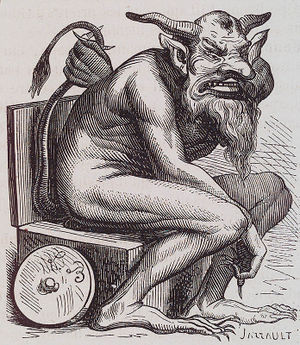On November 27th, 2022, the 8,000th article was added to the SuccuWiki!
Belphegor: Difference between revisions
m (mi) |
mNo edit summary |
||
| Line 1: | Line 1: | ||
[[Category:Demon Names]] | [[Category:Demon Names]] | ||
''The following article is in the SuccuWiki for the sake of completeness.'' | |||
Belphegor | [[Image:Belphegor.jpg|right|thumb|Belphegor illustration from the ''Dictionnaire Infernal'']] | ||
In [[demonology]], '''Belphegor''' (or '''Beelphegor''', {בַּעַל-פְּעוֹר}} ''baʿal-pəʿōr'') is a [[demon]], and one of the seven princes of Hell, who helps people make discoveries. He seduces people by suggesting to them ingenious inventions that will make them rich. According to some 16th-century demonologists, his power is stronger in April. Bishop and witch-hunter Peter Binsfeld believed that Belphegor tempts by means of laziness.<ref>{{cite book|title=Merriam-Webster's Encyclopedia of World Religions |author= Wendy Doniger|year= 1999|url= http://books.google.com/books?visbn=0-87779-044-2&id=ZP_f9icf2roC&pg=RA1-PA287&lpg=RA1-PA287&dq=Belphegor+Demon&ie=ISO-8859-1&output=html|isbn=0-87779-044-2}}</ref> Also, according to Peter Binsfeld's ''Binsfeld's Classification of Demons'', Belphegor is the chief demon of the deadly sin known as Sloth in Christian tradition.<ref>Encyclopedia of Demons and Demonology, By Rosemary Guiley, p. 28-29, Facts on File, 2009.</ref> | |||
As a | Belphegor originated as the Assyrian Baal-Peor, the Moabitish god to whom the Israelites became attached in Shittim (Numbers 25:3), which was associated with licentiousness and orgies. It was worshipped in the form of a phallus. As a demon, he is described in Kabbalistic writings as the "disputer", an enemy of the sixth Sephiroth "beauty". When summoned, he can grant riches, the power of discovery and ingenious invention. His role as a demon was to sow discord among men and seduce them to evil through the apportionment of wealth. | ||
Belphegor | The palindromic prime number 1000000000000066600000000000001 is known as Belphegor's Prime, due to the superstitious significance of the numbers it contains. Belphegor's Prime consists of the number 666, on either side enclosed by thirteen zeroes and a one. | ||
According to | According to Collin de Plancy's ''Dictionnaire Infernal'', Belphegor was Hell's ambassador to France. Consequently, his adversary is St Mary Magdalene, one of the patron saints of France. Belphegor also figures in John Milton's ''Paradise Lost'' and in Victor Hugo's ''The Toilers of the Sea''. | ||
== References == | == References == | ||
{{Reflist}} | |||
==External Links== | |||
*[http://en.wikipedia.org/wiki/Belphegor The original source of this article at Wikipedia] | |||
Latest revision as of 13:31, 13 December 2013
The following article is in the SuccuWiki for the sake of completeness.
In demonology, Belphegor (or Beelphegor, {בַּעַל-פְּעוֹר}} baʿal-pəʿōr) is a demon, and one of the seven princes of Hell, who helps people make discoveries. He seduces people by suggesting to them ingenious inventions that will make them rich. According to some 16th-century demonologists, his power is stronger in April. Bishop and witch-hunter Peter Binsfeld believed that Belphegor tempts by means of laziness.[1] Also, according to Peter Binsfeld's Binsfeld's Classification of Demons, Belphegor is the chief demon of the deadly sin known as Sloth in Christian tradition.[2]
Belphegor originated as the Assyrian Baal-Peor, the Moabitish god to whom the Israelites became attached in Shittim (Numbers 25:3), which was associated with licentiousness and orgies. It was worshipped in the form of a phallus. As a demon, he is described in Kabbalistic writings as the "disputer", an enemy of the sixth Sephiroth "beauty". When summoned, he can grant riches, the power of discovery and ingenious invention. His role as a demon was to sow discord among men and seduce them to evil through the apportionment of wealth.
The palindromic prime number 1000000000000066600000000000001 is known as Belphegor's Prime, due to the superstitious significance of the numbers it contains. Belphegor's Prime consists of the number 666, on either side enclosed by thirteen zeroes and a one.
According to Collin de Plancy's Dictionnaire Infernal, Belphegor was Hell's ambassador to France. Consequently, his adversary is St Mary Magdalene, one of the patron saints of France. Belphegor also figures in John Milton's Paradise Lost and in Victor Hugo's The Toilers of the Sea.
References
- ↑ Wendy Doniger (1999). Merriam-Webster's Encyclopedia of World Religions.
- ↑ Encyclopedia of Demons and Demonology, By Rosemary Guiley, p. 28-29, Facts on File, 2009.
